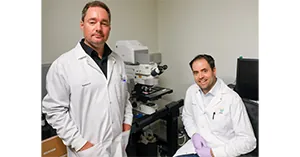
Breakthrough in Type 1 Diabetes Treatment: Scientists Use Reprogrammed Fat Cells!
2024-11-03
Author: Siti
Breakthrough in Type 1 Diabetes Treatment: Scientists Use Reprogrammed Fat Cells!
In a groundbreaking study published in the prestigious journal Cell, scientists are revealing a promising new method for treating type 1 diabetes through the use of pluripotent stem cells. This innovative research, conducted in China, has the potential to revolutionize diabetes care and offers new hope for millions affected by this condition.
What sets this study apart is the unexpected source of the stem cells: reprogrammed fat cells. Instead of traditional approaches commonly associated with diabetes treatment, researchers are harnessing the power of adipose tissue to create what they call “chemically induced pluripotent stem-cell-derived islets” or CiPSCs. This method not only challenges conventional thinking in the medical community but also demonstrates an effective solution for diabetes management.
The experimental phase began with successful trials involving mice, leading researchers to progress to human application. By using fat cells from a patient, they introduced these CiPSCs back into the individual’s body, resulting in a remarkable restoration of insulin production. The results have been nothing short of astonishing—just 75 days post-treatment, the patient experienced insulin independence, and a year later, the benefits remain intact.
Lead author Hongkui Deng expressed his excitement about the rapid results, stating, “The quick reversal of diabetes and the achievement of insulin independence after transplantation were surprising even to us.” Such outcomes have sparked enthusiasm within the scientific community, suggesting that further clinical studies into CiPSC-islet transplantation are crucial.
As the discussion around this innovative treatment gains momentum, many are left wondering when we might see similar trials begin in the United States. Currently, the FDA has only approved one stem cell-based therapy, which raises questions about the regulatory pathway for new advancements in this arena. Nonetheless, the potential impact of this treatment on public health is enormous, addressing a disease that has extensive repercussions on overall well-being.
Stay tuned as this story develops, as it may pave the way for new protocols and breakthroughs in battling type 1 diabetes—a condition that affects approximately 1.6 million people in the U.S. alone. This discovery could not only change lives but also mark a significant leap forward in the fight against chronic illnesses for future generations.





 Brasil (PT)
Brasil (PT)
 Canada (EN)
Canada (EN)
 Chile (ES)
Chile (ES)
 España (ES)
España (ES)
 France (FR)
France (FR)
 Hong Kong (EN)
Hong Kong (EN)
 Italia (IT)
Italia (IT)
 日本 (JA)
日本 (JA)
 Magyarország (HU)
Magyarország (HU)
 Norge (NO)
Norge (NO)
 Polska (PL)
Polska (PL)
 Schweiz (DE)
Schweiz (DE)
 Singapore (EN)
Singapore (EN)
 Sverige (SV)
Sverige (SV)
 Suomi (FI)
Suomi (FI)
 Türkiye (TR)
Türkiye (TR)